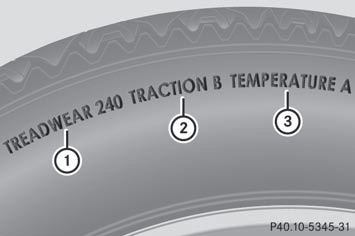Uniform Tire Quality Grading Standards
Overview of Tire Quality Grading Standards

The Uniform Tire Quality Grading is a U.S.
Government requirement. Their purpose is to provide drivers with consistent and reliable information regarding tire performance. Tire manufacturers are required to grade tires using three performance factors: tread wear 1, tire traction 2, and temperature resistance 3. Although not a Government of Canada requirement, all tires made for sale in North America have these grades branded on the sidewall.

The actual values for tires are vehiclespecific
and may deviate from the values in
the illustration.
Where applicable, the tire grading information can be found on the tire sidewall between the tread shoulder and maximum tire width.
For example:

All passenger car tires must conform to the statutory safety requirements in addition to these grades.
Tread wear
The tread wear grade is a comparative rating based on the wear rate of the tire when tested under controlled conditions on a specified U.S. government course. For example, a tire graded 150 would wear one and one-half times as well on the government course as a tire graded 100.
The relative performance of tires depends upon the actual conditions of their use, however, and may depart significantly from the norm, due to variations in driving habits, service practices and differences in road characteristics and climate conditions.
Traction
 WARNING
WARNING
The traction grade assigned to this tire is
based on straight-ahead braking traction
tests, and does not include acceleration,
cornering, hydroplaning, or peak traction
characteristics.
The traction grades, from highest to lowest, are AA, A, B, and C. Those grades represent the tire's ability to stop on a wet surface as measured under controlled conditions on specified government test surfaces of asphalt and concrete. A tire marked C may have poor traction performance.
 WARNING
WARNING
If ice has formed on the road, tire traction will
be substantially reduced. Under such weather
conditions, drive, steer and brake with
extreme caution.
The safe speed on a wet, snow covered or icy road is always lower than on dry road surfaces.
You should pay special attention to road conditions when temperatures are around the freezing point.
Mercedes-Benz recommends a minimum tire tread depth of 1/6 in (4 mm) for all four winter tires to maintain normal driving characteristics in winter. Winter tires can reduce the braking distance on snow covered surfaces in comparison to summer tires.
Stopping distance, however, is still considerably greater than when the road is not covered with ice or snow. Take appropriate care when driving.

Avoid wheelspin. This can lead to damage
to the drive train.
Temperature
 WARNING
WARNING
The temperature grade for this tire is
established for a tire that is properly inflated
and not overloaded. Excessive speed,
underinflation, or excessive loading, either
separately or in combination, can cause
excessive heat build-up and possible tire
failure.
The temperature grades are A (the highest), B, and C. These represent the tire's resistance to the generation of heat and its ability to dissipate heat when tested under controlled conditions on a specified indoor laboratory test wheel. Sustained high temperature can cause the material of the tire to degenerate and reduce tire life, and excessive temperature can lead to sudden tire failure. The grade C corresponds to a level of performance which all passenger car tires must meet under the Federal Motor Vehicle Safety Standard No. 109. Grades B and A represent higher levels of performance on the laboratory test wheel than the minimum required by law.
See also:
Defrosting the windows
Windows fogged up on the inside
► Activate the cooling with air
dehumidification function.
► Activate automatic mode .
► If the windows continue to fog up, activate
the defrost ...
Important safety notes
WARNING
Very hot or very cold air can flow from the air
vents. This could result in burns or frostbite in
the immediate vicinity of the air vents. There
is a risk of injury.
Make sure that all ...
Removing the emergency spare wheel
Emergency spare wheel (example: vehicle without
lockable cargo compartment floor)
1 Emergency spare wheel retainer
2 Stowage well
3 "Minispare" emergency spare wheel
The "Minispa ...
